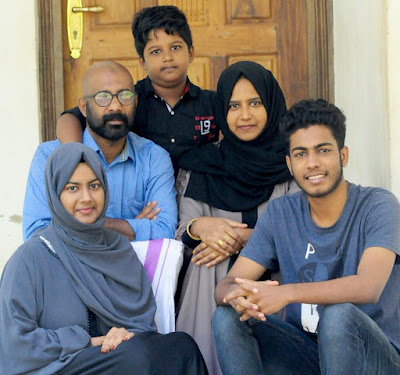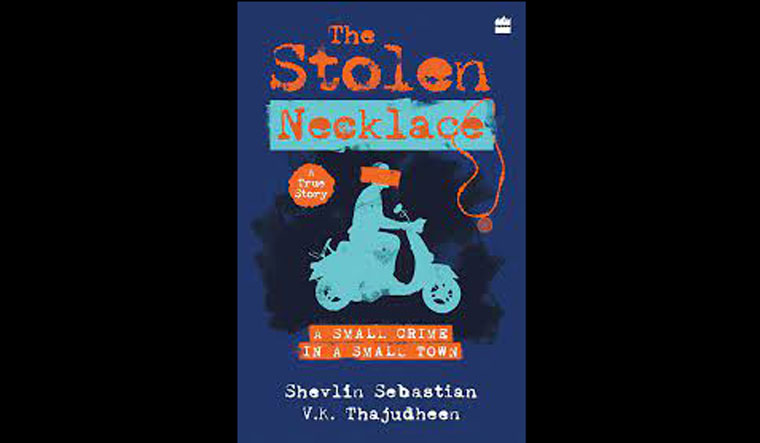Photo: VK Thajudheen and his family
Mainstream, VOL 61 No 24, June 10, 2023
 A Story of Police Injustice – And Reprieve | M.R. Narayan Swamy
A Story of Police Injustice – And Reprieve | M.R. Narayan Swamy
Friday 9 June 2023
#socialtagsBOOK REVIEW
by M.R. Narayan Swamy
The Stolen Necklace: A Small Crime in a Small Town
by Shevlin Sebastian and V.K. Thajudheen
HarperCollins India
Pages: xi + 249
ISBN-10 : 9356296855
ISBN-13 : 978-9356296855
Price: Rs 399
It happened in a small town in Kerala but it could have happened anywhere in India – and to anyone, more so if one couldn’t pull the right strings. V.T. Thajudheen was adamant he had committed no crime. Yet the police were sure he snatched a gold necklace of a woman, and even had photographic evidence of him in the act. Now, how could this be possible?
A middle-aged man working in Doha, Thajudheen had returned to Thalassery in northern Kerala for his daughter’s marriage when his nightmare began. On his return home after the nikah, he was confronted by a group of police personnel led by Sub-Inspector P. Biju of the Chakkarakkal police station.
The police insisted he had stolen the necklace. For proof, a policeman flashed a grab taken from a CCTV. It showed a balding man with thick ears seated on a white Honda Activa scooter. He was bespectacled and had a scraggly black beard. He also had a black watch on the left hand.
True, the man resembled Thajudheen. Even he felt so. Bit he neither had a scooter nor could he recognize the place where the incident took place on the afternoon of July 5, 2018. But it was a frightening accusation. Anyone who saw the CCTV footage was likely to believe that Thajudheen was the culprit.
Even before he and his family members could digest what was happening, Officer Biju let the cat out of the bag. There could be a "compromise", he suggested; if Thajudheen paid the cost of the gold chain, no arrest would be made, and "your reputation will be intact". For good measure, Biju added: "Your daughter has just got married. The reputation of your family is at stake. We will inform the media that you are the thief (if there is no compromise)."
In simple words, the police were demanding a bribe – to let him go. Thajudheen refused to bow down. He concluded there was hardly any difference between the police and criminals in India except that one of them wore khaki. He knew that succumbing now would lead to more blackmail. After some initial hesitation, his family agreed. His son had dreamt of joining the police; now he was not so sure.
Once Thajudheen refused to pay up and insisted he was innocent and was being framed, the police hardened their stance. Rough interrogation followed. He was also suspected of involvement in the murder of a jewellery shop owner a few years ago as well as another chain-snatching incident. The court went by what the police said. Thajudheen was sent to jail where he would spend an agonizing 54 days.
Like most simple and law-abiding people, Thajudheen had lived in a bubble amid family and friends. The police, judiciary, and bureaucracy were all far removed from his life. Now he found himself behind bars, sharing space with real and alleged criminals. It was morale-shattering. He often skipped breakfast. He became thinner and thinner, shedding about 25 kg. His eyes sunk and he developed a stoop. Many nights he cried himself to sleep. When he finally walked out of prison, his hands and legs were like sticks. His cheeks and chest had shrunk. His stubble was mostly white hair.
Thanks to the efforts of his family and friends who raised a stink and with help took up the issue with Chief Minister Pinarayi Vijayan, a fresh investigation was launched. This led to the real culprit who very much resembled the man in the CCTV and was already in jail over another crime. Thajudheen was released and became an instant media celebrity. Neighbours and others who had believed he was indeed a thief meekly apologized. But the false accusation and time spent in prison had done grave psychological and emotional damage to him.
Amid a public uproar, the police withheld officer Biju’s annual salary increment for three years. A lawyer filed a case demanding Biju’s dismissal from the police. Thajudheen unfortunately faced further problems on his return to Qatar although these had nothing to do directly with the Kerala ordeal. He eventually returned to India to a subdued routine life.
The book is based on a real story although written like a racy fiction. The charges against Thajudheen may have been purely criminal in nature but we know there are countless Thajudheens who suffer long years in custody and also undergo terrible torture after being accused of unproven terrorist offences. In both cases, the police find it easy to frame innocents in a bid to "solve" difficult cases. What happened to Thajudheen is a shame; what happens to the other Thajudheens who have no one to back them is a scandal.

_page-0001.jpg)


 By Anansiya Sabu Updated
By Anansiya Sabu Updated